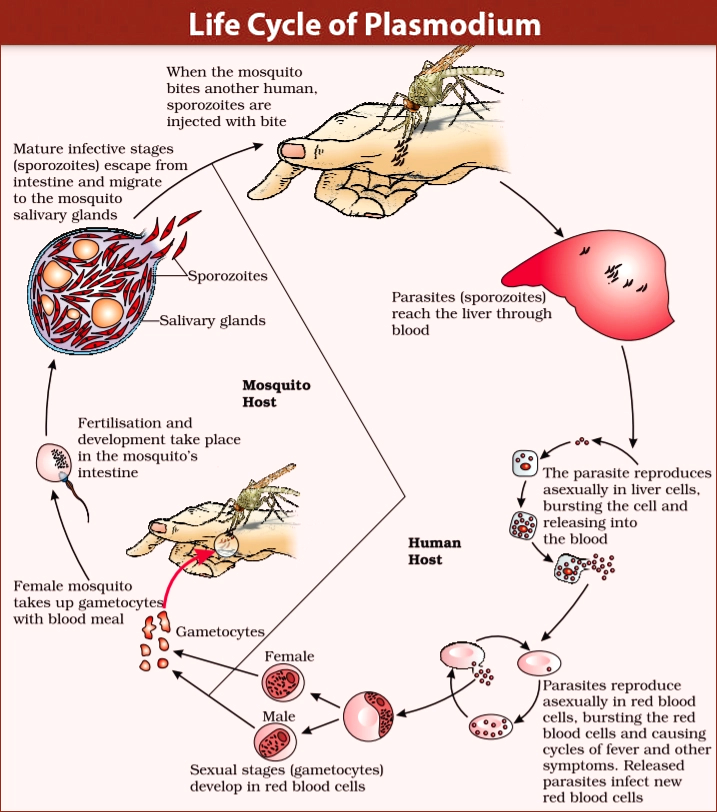Science & Technology
Artificial Light to Fight Against Malaria
- 06 Jun 2022
- 7 min read
For Prelims: Malaria, Malaria Vaccine, World Health Organization, Artificial Light, Light Emitting Diode (LED) light
For Mains: Measures and Strategies to Prevent the Spread of Malaria
Why in News?
Recently, a study demonstrated that artificial lights can be used as a weapon to fight against malaria.
What are the key highlights?
- Light plays a crucial role in the regulation of biological clocks such as timing of breeding among birds, hunting by lions and sleeping patterns of humans.
- The timing of day and night has remained relatively constant owing to the earth’s rotation, life on the planet has evolved with such regular day-night cycles.
- Melatonin hormone is a gene responsible for regulating the sleep-awake cycles.
- It is found in plants as well as animals.
- A rapid change in the natural sleep cycles has been observed on account of increased use of artificial light.
- Currently, around 80% of the world’s population is living under artificially lit skies.
What can be the Impact of Artificial Light on Malaria?
- Artificial light can alter mosquito biology.
- Malaria-transmitting mosquito species "Anopheles” feeds at night.
- Using artificial light, the mosquitoes can be tricked to behave as if it’s daytime.
- A short pulse of Light Emitting Diode (LED) light, commonly can delay the onset of biting by hours in the mosquito “Anopheles”.
- Therefore, it reduces biting rates and malaria transfer.
What are the Challenges?
- The first challenge is that it is still unclear how artificial lights might be used to lessen the risk of malaria infections.
- Demonstration of the effects of artificial light in controlled laboratory settings is one thing, but rolling out their use as an effective vector control strategy is quite another.
- Moreover, LED light can have negative impacts on human health like disrupted sleep.
What is Malaria?
- About:
- Malaria is a life-threatening mosquito borne blood disease caused by plasmodium parasites. It is predominantly found in the tropical and subtropical areas of Africa, South America as well as Asia.
- The parasites spread through the bites of infected female Anopheles mosquitoes.
- After entering the human body, parasites initially multiply within the liver cells and then attack the Red Blood Cells (RBCs) resulting in their rupture.
- There are 5 parasite species that cause malaria in humans, and 2 of these species – Plasmodium falciparum and Plasmodium vivax – pose the greatest threat.
- Symptoms of malaria include fever and flu-like illness, including shaking chills, headache, muscle aches, and tiredness.
- It is preventable as well as curable.
- Malaria Vaccine:
- Known by its lab initials as RTS, S but branded as Mosquirix, the vaccine has passed lengthy scientific trials that found it to be safe and reducing the risk of malaria by nearly 40%, the best recorded.
- It was developed by GlaxoSmithKline (GSK) company and approved by the European Medicines Agency in 2015.
- The RTS, S vaccine trains the immune system to attack the malaria parasite (Plasmodium (P.) falciparum, the deadliest species of the malaria parasite).
- Global Scenario:
- Although a decline in total no. of cases from about 81.1 cases per 1,000 population to 59 per 1,000 since 2000, the world has not yet won the war against Malaria.
- Globally, around 240 million cases and 6,00,000 deaths were reported in 2020.
- Africa carries the world’s largest disease burden for Malaria.
- In Africa, 94% of global cases and 96% of global deaths have been recorded. It is alarming that children aged five or younger account for 80% of these deaths.
- Challenges
- Though vaccines look promising, antimalarial drug resistance specifically in East Africa is rising.
- Genetic mutations in the parasite enables them to escape routine diagnosis.
- Increased resistance to insecticides has been evolving in the mosquitoes.
- Need of the hour
- This situation undermines the requirement for sharpening the vector control options, and exploring new strategies.
Way Forward
- Impacts of artificial light use needs to be fully understood before thinking about the implementation strategy.
- The growing body of work on this issue suggests that this definitely needs more attention from the World Health Organization (WHO) and other relevant bodies.
UPSC Civil Services Examination, Previous Year Question
Q. Widespread resistance of malarial parasite to drugs like chloroquine has prompted attempts to develop a malarial vaccine to combat malaria. Why is it difficult to develop an effective malaria vaccine? (2010)
(a) Malaria is caused by several species of Plasmodium
(b) Man does not develop immunity to malaria during natural infection
(c) Vaccines can be developed only against bacteria
(d) Man is only an intermediate host and not the definitive host
Ans: (b)
Exp:
- Malaria is a life-threatening disease caused by Plasmodium parasites that are transmitted to people through infected female Anopheles mosquitoes.
- The malarial parasite has an extraordinary ability to evade the immune system, which explains the difficulty in developing an effective malaria vaccine.
- RTS,S/AS01 (RTS,S) is the first and, to date, the only vaccine to show partial protection against malaria in young children.
- Therefore, option (b) is the correct answer.





